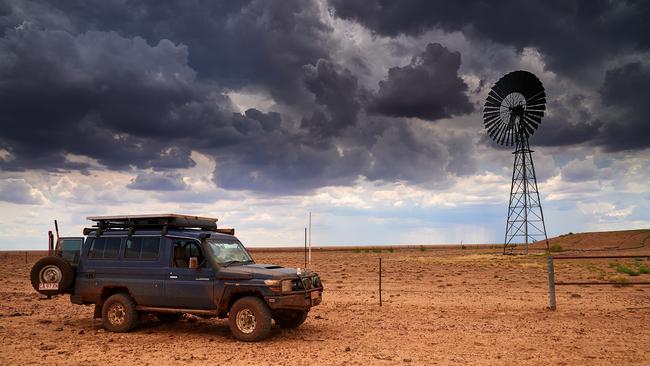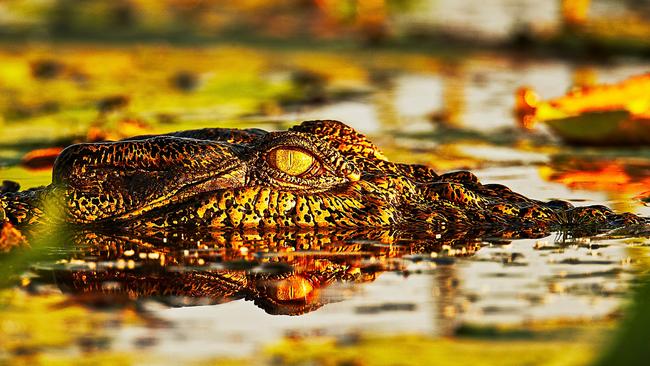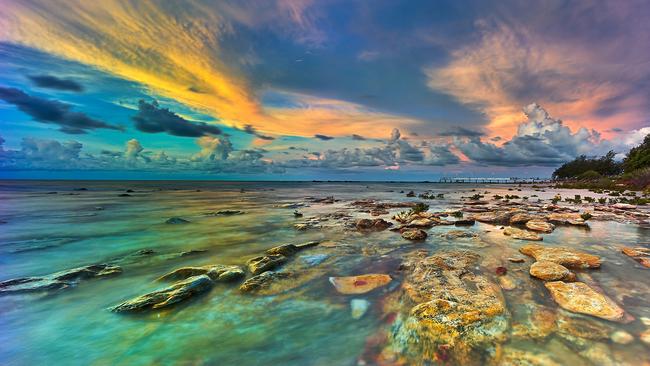PAUL Arnold has been a missing person just once.
The landscape and wildlife photographer was known to venture out to the most remote areas of the country, particularly the NT, for weeks on end, but would always contact his wife Julie every seven days if his satellite phone failed.
When it had been more than seven days since a phone call in 2014, Julie rang the police and reported him missing.
Luckily he was in one of his favourite places in the Barkly region.
“I camped there one night and I couldn’t see my hand in front of my face, the fog was so thick,” he said.
After getting the shot he was after, he attempted to venture home. But, after 400ml of rain overnight, the river crossings began to overflow.
“It was too risky, so I turn around to go back,” he said.
“But by the time I got back the other river had gone up and I was stuck. I had my EPIRB, but my sat phone wasn’t working, so Julie called the police and reported me missing.
“I wasn’t missing, the world just didn’t know where I was.”

Barefoot and with a well-worn Akubra perched on his head, Arnold cuts the perfect image of a Territory bushman. But rather than wrangling cattle, it’s the perfect image he’s chasing.
The picturesque landscapes documented in his photography require travelling to unforgiving places where one careless move can end in chaos.
The dangers are not lost on Arnold, who travels with a fully equipped 4WD and knowledge of survival skills. He carries 270L of spare fuel, enough to last 1700km, six weeks’ worth of food, and stacks of mechanical gear.
“I went to the desert last year for 54 days of no internet, no phone, no communications,” he said.
“For 18 days I didn’t see a human being and just drove around inside the desert.”

Arnold has always sought solitude. And when life-threatening situations arise, he has more than 20 years of problem-solving experience under his belt.
The first time Arnold found himself in strife was on a remote stretch of road called the Hunt Oil Track, which joined the Great Central Road and Gunbarrel Highway.
“No one goes down it anymore — it’s completely closed in. You lose paint as you drive down,” he said.
On this trip Arnold veered off the road and hit a patch of peaty ground. His four-tonne troopy sank immediately into the soft earth. When he tried to move, it sank a further two inches.
“It was late afternoon, so I’ve quickly run the winch out — there were two trees, so I’ve run the winch out to the closest tree and ripped it straight out of the ground,” he said.
Arnold set up camp for the night and collected timber to pile under the wheels of the car.
“I got the high-lift jack to get the car up, but it’s got such massive suspension on it you can boost the car up a foot and the tyre moves an inch.”
As the car lifted he managed to slide a board under the tyres and drive out, but only after many frustrating moments.
“Because I’m by myself I’m always conscious of taking it slow and, if you get the shits with it, go and calm down with a cuppa,” he said.

Arnold is acutely aware of how self-reliant he has to be. Rash thinking, frustration and complacency all become deadly when there is not a human soul for thousands of kilometres.
“You become different, aye,” he said.
“When you’re in the city you think ‘she’ll be right, someone will help me’.
“Out there you become very detached, very unemotional generally, you know that it’s either die or get out.”
Arnold said his mind focuses on each challenge as it is thrown at him.
“Very quickly you figure out what will work, what won’t work and it’s a way of life.
“I’ve got EPIRBs, but knocking yourself out with a kangaroo jack — you’re f---ked. You can’t go and try and get your EPIRB because you’re unconscious on the ground.”

Arnold first picked up a camera in 2003 after spending years in the defence force and mining industry.
He set about travelling with Julie, a nurse, and began selling his photographs at Mindil Beach Market, soon creating a name for himself.
He opened his first storefront in 2008 on Mitchell Street, and recently relocated to Knuckey Street.
“I rocked up to Mindil in 2004 selling photos and there were eight of us there,” he said.
Arnold worked the market circuit from Thursday to Sunday and, as night fell on the last day of the weekend, he’d jump in the car and head out to Yellow Water.
“I’d sit in a tinny all day, frame Tuesday and Wednesday, and get ready for Thursday,” he said.
“That’s how I got all those bird shots, by doing those stupid hours.”

While Arnold has spent days stranded due to car issues, it’s when he is at nature’s mercy he feels most vulnerable.
“I saw this croc on the bank in Yellow Water and I’ve drifted in and sat on the mud,” he said.
“With a croc you always give them an escape route, a natural way they would go, so they don’t feel so threatened.
“I sat there for about half an hour photographing them and, when I thought it was time to go, the motor wouldn’t start. So I’m sitting there pulling on the motor and there’s all these movements and he didn’t like it.
“Instead of going in front of the boat like I’d planned, he went down the side.”
Staring a crocodile in the face less than half a metre away, Arnold did what anyone would do.
“I’ve just shit myself,” he said. “I was ready to jump out of the boat and run somewhere, and watch my boat and camera gear get totalled.”
Obviously the bushman lived to tell the tale, and the crocodile disappeared back in to the murky water. Other times he hasn’t been so lucky.
While Arnold still has all his limbs intact, the waterways of the Territory have swallowed tens of thousands of dollars’ worth of camera gear.
In 2008, while sitting in a tinny with a mate, Arnold attempted to pull-start the motor to move on.
“My hands slipped off and I’ve bumped the camera set up,” he said. Arnold grabbed the leg of the tripod to make sure it didn’t fall in — and $30,000 worth of kit toppled off into the water.
The bolt attaching the camera to the tripod had snapped. He and his mate sat, stunned.
“My mate in the front of the boat has just gone ‘did that just really happen?’” he said.
There was no point jumping in after it, unless he wanted to become a real missing person.
Paul now spends most of his days in town, but is planning to escape the rat race of the city for a few months next year out in the open.
In the meantime, the fruits of his labour and these dicey situations are on sale at his Knuckey Street gallery, and through a pop-up store located in Casuarina until December 24.


Add your comment to this story
To join the conversation, please log in. Don't have an account? Register
Join the conversation, you are commenting as Logout
‘Not all private schools are castles’: School funding face-off
From Tiwi to Toorak, the contrast in independent schools is stark, with the lead proponent for the sector stating, ‘not all private schools are castles’. Read the details.
‘It’s a nightmare’: Rural residents left in dark as phone and internet woes worsen
While modern communication is vital for rural Australians, many living within an hour of Darwin are finding their connection to the outside world growing weaker by the day.